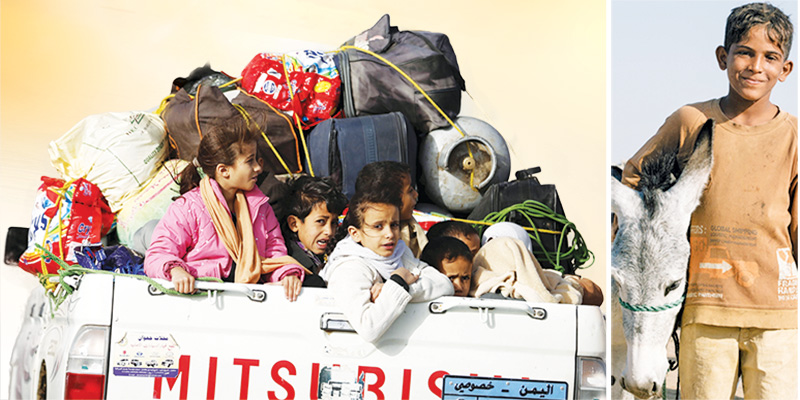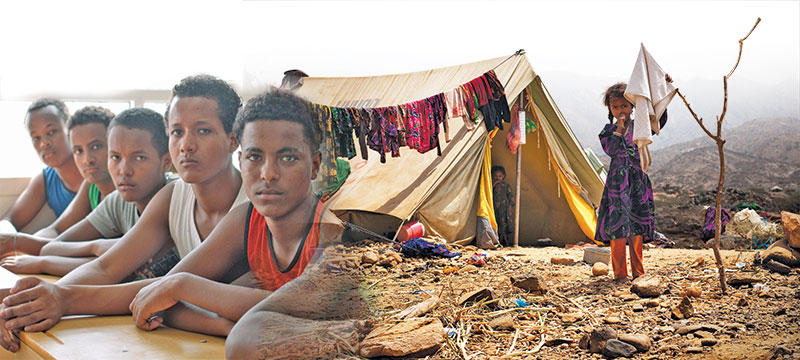One of the Dozens of Problems Facing Yemen Is Immigration
Every year, thousands of people leave their homes and migrate to Yemen from other parts of Africa, or else abandon their homes, friends and relatives in Yemen and go to other countries. Some do this because of poverty while others out of fear for their lives. Whatever the reason, migration is one of the greatest problems facing Yemen. Whether it stems from domestic or external conditions, a solution needs to be found because uncontrolled migration can bring about significant problems.
In April of 2013, the Yemeni Department of Immigration (YDI) announced that the number of people who had left their homes because of conflicts and fled to different regions within the country had passed half a million. Set up in 2009 to provide migrants with food and housing assistance, the department said that migrants are now in much worse condition. Due to the World Food Program (WFP) stepping up its assistance for Syrian refugees, the amount of food aid reaching migrants within Yemen has fallen by half.
 |
Another problem concerning migration for Yemen is the migration overseas of an educated work force seeking a better income. More than one million have emigrated for that reason. Although losing well-educated and qualified people is a problem for Yemen, it is also not without its benefits; Yemenis who migrate overseas contribute indirectly to the country's economy by the foreign remittances they send home to their families. These migrants may also take part in voluntary activities on behalf of Yemen in the countries they live in.
The number of those fleeing to neighboring countries due to conflicts or poverty is quite large. There are estimated to be 900,000 Yemeni migrants in the Middle East and various African countries and some 700,000 in Saudi Arabia.
 |
When the civil war in Somalia broke out, some 60,000 Yemenis returned home, but that was not the sole source of migration to Yemen from Somalia. The instability in Somalia led to an explosion in the number of migrants from Yemen to Somalia. Various authorities now say there are 700,000 Somalis in Yemen.
Ethiopia is another source of migration to Yemen in East Africa. There are an estimated 10,000 Ethiopians in Yemen. However, it also needs to be said that these figures are not entirely reliable, since they are not confirmed by official bodies.
According to a U.N. report published in 2008, 50,000 migrants reached Yemen from Africa a year.
Migrants generally reach Yemen from East Africa by sea, under very difficult conditions, and usually fall into the hands of human traffickers. Most migrants, who give their last few pennies to the traffickers, are brought to Yemen in rickety boats. These boats are very frail and lack even the most basic amenities, and are of dubious seaworthiness.
 |
| 1. UN: More than half a million people in Yemen left their homes - Daily Zaman, 21.05.2015 |
In order to avoid being apprehended by the security forces, the traffickers prefer to drop the migrants off in remote areas rather than in harbors. Indeed, they sometimes throw them into the sea miles from shore, or else sink the boats. The boats that carry the migrants often deliver them to their deaths; many migrants drown at sea.
Reaching the Yemeni shore does not mean salvation for the migrants. Even if they are legally admitted to Yemen, they still have to live under very difficult conditions in the country, where unemployment is very high.
Somalis generally work for very low wages doing jobs that Yemenis are unwilling to do. A Somali migrant in Yemen earns an average of $50 a month. In addition to the hard work they do, migrants are generally despised.
 |
Such behavior is totally unbecoming of a Muslim. In verse 83 of Surat al-Baqara, our infinitely merciful Lord commands us that in order to establish social peace, the poor should not be despised, but treated well.
No Muslim must forget that the Muslims of Medina embraced the Muslims who migrated there in the time of our Prophet (pbuh) with sincerity and love. Muslims must adopt them as role models.
The Islamic world now needs the solidarity personified by the spirit of brotherhood among the pilgrims and the Ansar. Feelings such as hatred and ruthlessness must be purged from people's hearts, and replaced by brotherhood, compassion, love, affection and positive thoughts.
Believers have a responsibility to treat other believers with enormous compassion and modesty; any other behavior is incompatible with the Qur'an. Arrogance, jealousy, intolerance, rude speech and quarrelsomeness are features of deniers, not of Muslims. Therefore, a believer who has made such a mistake because of his lower self must immediately pull himself together, seek shelter in God and behave like a true believer.
- Introduction
- Two Countries Geographically Far Apart But Very Close in Heart and Soul: Yemen and Turkey
- Yemen, But What Sort of Yemen?
- The Problem of Poverty in Yemen and Regeneration
- How To Ensure the National Unity of Yemen?
- How Can Yemen Best Make Use of Its Natural Wealth?
- Women's Place in Yemeni Society
- The Lowest Common Denominators the Parties in Yemen Can Agree on
- The Importance of Individual Rights and Freedoms in Yemen
- Terror Is Again at the Top of Yemen's Agenda
- The Corruption Eating Away at Yemen from the Inside
- One of the Dozens of Problems Facing Yemen Is Immigration
- Key to Democracy and Development in Yemen: Education
- Countries Swamped by Debt and Interest
- Political Life in Yemen
- Why Is Military Spending Significant?
- Houthis Are the Brothers of All Yemenis
- Yemen Must Not Fall into the Trap of Identity Politics
- The Protests in Yemen Should Not Turn into a Mass Frenzy
- Mindsets Need To Change for A Permanent Peace in Yemen
- What Can Be Done To Ensure Stability in Yemen?
- Will the New Government in Yemen Bring Stability?
- Yemen Doesn't Deserve To Be A Failed Country
- The Problems of Yemen Can Be Solved When A Strong National Security Is Built
- Military Operations Do Not Always Produce A Solution
- Political Instability in Yemen Is Having a Damaging Effect on Children
- Spirit of Unity a Must for Yemen's Political Transition
- What Yemen Needs Is a Spirit of Union and Unity
- Yemenis Must Be Friends, Not Enemies
- There Is Still Hope for Peace and Democracy
- The Struggle for Power Must Not Break Yemen Apart
- Yemen Must Not Become a Trojan Horse on the Arabian Peninsula
- Developments in Bahrain, Yemen and Other Islamic Countries Must Not Be Allowed To Turn into A Sectarian Conflict
- Is This the Will of Yemenis or the Global Powers?
- Operation Decisive Storm Brings Not Stability But Death to Yemen
- Turkey Asks for Peace in Yemen, Not War
- Deaths Cannot Stop More People Being Killed
- Yemen Needs Urgent Ceasefire
- What Is Happening in Yemen Is No Longer a Political, but a Humanitarian Crisis
- An International Model To Put an End to the Conflict in the Islamic World Is Possible
- A Lack of Quality Is Feeding the Conflicts in the Islamic World
- Yemen: A Country That Nobody Sees and Nobody Hears
- The Only Solution to the Tragedy in Yemen: The Reconstruction of Peace and Love
- Conclusion
